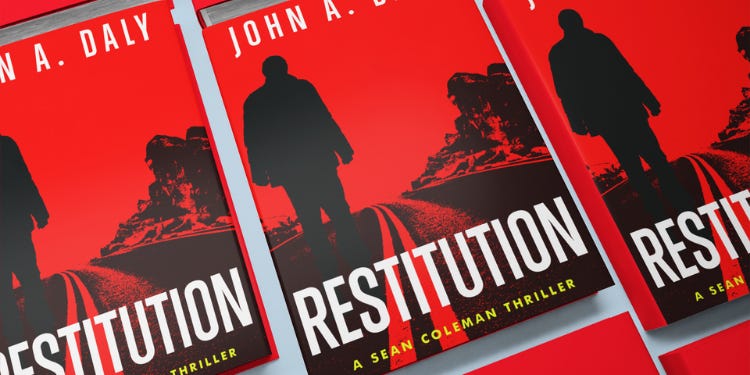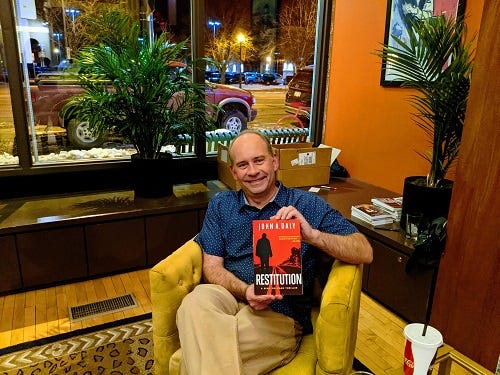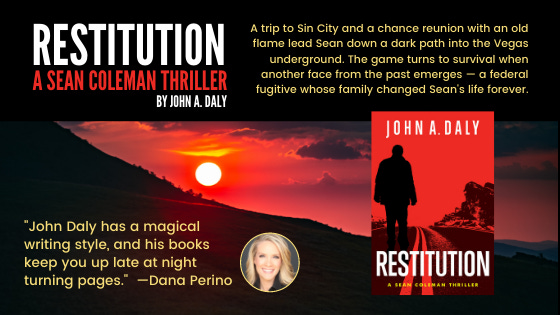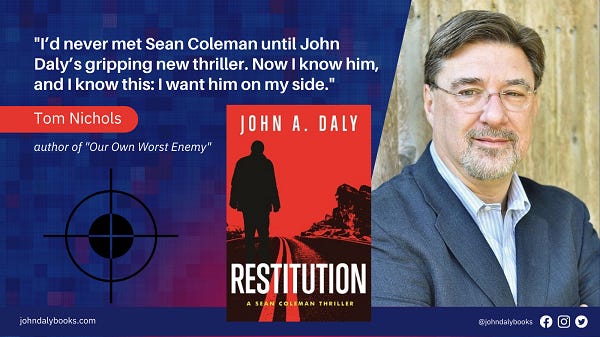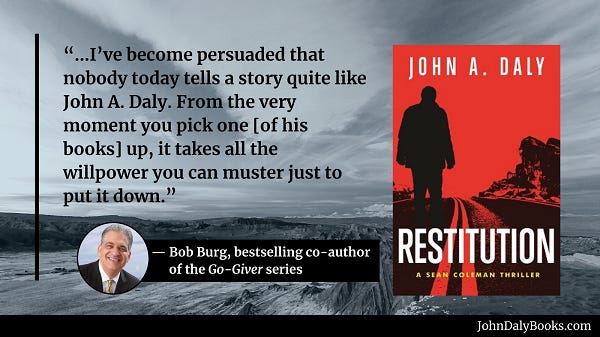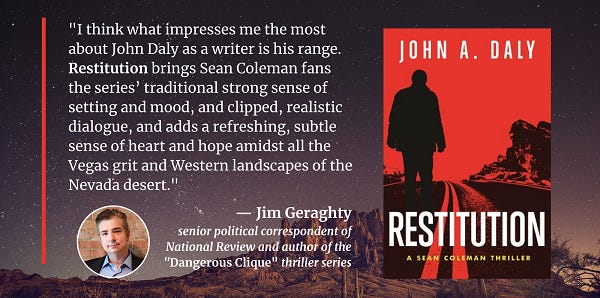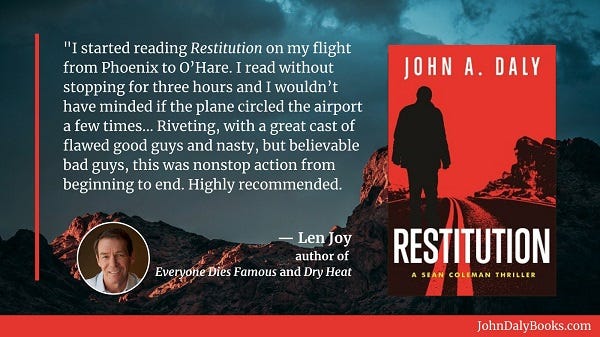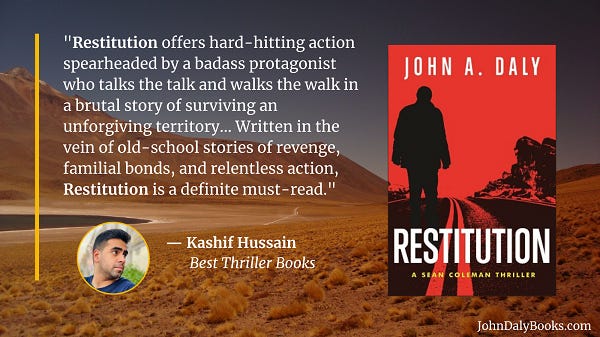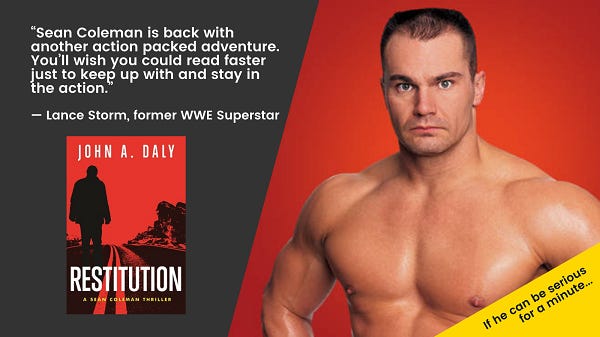Interview: John A. Daly, Author of the "Restitution"
His latest book in the Sean Coleman Thriller series releases today.
Note from Bernie: I hope you enjoy this interview I did with our own John Daly, who is not only a thoughtful political columnist (for my website and other publications), but also a novelist. He has just written another page-turner with RESTITUTION, book #5 in his Sean Coleman Thriller series. Take a look, and if you’re into thrillers, you can click here to buy his book(s). (This is a non-member column; open to all). Thanks. —Bernie Goldberg
Bernie Goldberg: Congratulations on the release of your fifth published novel. Your rugged thriller series has generated a lot of buzz over the years, including praise from New York Times bestselling authors and literary awards in your home-state of Colorado. I'm curious if you always wanted to be an author? Is this the fulfillment of a childhood dream?
John Daly: Actually, no. As a child, I had no interest at all in writing or storytelling. Becoming an author was the last thing on my mind. I didn't discover a real passion for writing until I was well into my twenties.
Goldberg: How did that come about?
Daly: Back in the early days of the Internet, I taught myself HTML and created a personal website. It was primarily a platform for writing about things I liked, whether it be rock bands or other interests. It wasn't anything special — just a fun little hobby when I wasn't developing software at work. At some point, I expanded the site to include film reviews, since I'm kind of a movie buff. I discovered that I really enjoyed writing about art and entertainment. An entertainment website somehow found my reviews, and was impressed enough to ask me to start writing reviews for them. It was an enjoyable side-gig, though it didn't pay much.
The first serious creative writing I did came in the form of poetry. I did a lot of bike riding as a young man, including along rural roads well outside of town. One day, when I was out in farmland, I got caught in a big downpour. It soaked me from top to bottom. As I rode back into town, my tires sending lots of water high into the air, the sun came out strongly, rainbows filled the sky, and I got a kick out watching neighborhood kids excitedly playing in an overflowing street gutter. The whole ordeal kind of consumed my senses, and when I got back home, I had this wild urge to write a poem about it — something I'd never even attempted before. I was surprised by how easily the words flowed, and I felt it turned out pretty well. A friend of mine thought it was much better than that, and her enthusiasm encouraged me to further pursue the interest.
It wasn't until I picked up a book by author Tim Green that I thought about trying my hand at fiction. Green writes young-adult sports novels these days, but years ago he put out a number of bestselling adult thriller novels. I was so taken back by his narrative voice, his writing style, and the grittiness in his storytelling that I wanted to be part of that world. I've been passionate about storytelling ever since, as well as the non-fiction commentary I write for websites including this one.
Goldberg: You've said in the past that your books aren't political, and that you like to keep your fiction writing separate from your political writing. But for someone who pays so close of attention to our crazy political landscape, I have to believe that certain political themes or stories have at least inspired some of the ideas in your books. Is this true?
Daly: Well, inspiration certainly comes from lots of different places, and I suppose that includes politics. Indeed, my novels are non-political, but I'd be lying if I said that political themes and observations haven't influenced some of my creative writing. If you extend or exaggerate certain concepts, you can come up with some pretty compelling material.
For example, I've written a lot about tribalism (on both sides) on this website. It's probably no coincidence that my last book, Safeguard, centered around a group of people whose dedication to an individual and cause had compelled them to surrender their better judgement, and collectively do things they wouldn't have otherwise done.
Another theme that's prevalent throughout my novels is fatherlessness. I don't write about the topic much in my political writing, but I recognize it as a very real societal problem. And I've presented Sean Coleman, in many ways, as a product of that problem. His father abandoned him and his family when he was young, and it's had lasting, negative effects that he's worked to overcome throughout the series.
Goldberg: Tell me about "Restitution," the latest book in the Sean Coleman Thriller series that just released today. Do readers have to have read your earlier books to understand this one?
Daly: No, they don't. I write my books mostly as standalones, and I make sure new readers are caught up to speed on any relevant happenings from the previous books. Restitution does have more callbacks than the others, but again, new readers won't be lost.
The book picks up about six months from where the previous installment, Safeguard, left things. Sean was at a bit of a turning point at the end of that book, and he has since gotten his act back together — at least tentatively. The story takes place on a trip Sean takes to Las Vegas with his police chief brother-in-law, Gary (who's been part of the series from the beginning), and his eccentric friend Dusty (a reader favorite from my book, Broken Slate), who's a professional birthday clown.
Goldberg: A birthday clown?
Daly: Yes (laughs). One of the hallmarks of the Sean Coleman thrillers is that they include a number of quirky, unusual characters, and I think Dusty represents that as well as anyone. The three men are actually in town for Dusty's bachelor party, but a twist of fate spawns a reunion between Sean and an old flame.
Sean's dedicated to getting past his personal demons, and has been on a mission to make amends with those he's hurt in the past. He views this chance encounter as an opportunity to do just that, but the path unexpectedly leads him into the Vegas underground, where another face from the past emerges — a federal fugitive whose family, years earlier, altered the course of Sean’s life.
The story ultimately turns to one of desert survival, when a harrowing escape drops Sean in the barren Nevada wasteland against a well-armed group of men.
Goldberg: Most of your books take place in the mountains of Colorado. Why did you decide on Las Vegas as the backdrop this time?
Daly: There were a couple reasons. In my books, I tend to write about places where I've actually been, and have absorbed the geography, culture, and architecture firsthand. It has to do with familiarity and attention to detail.
I grew up and still live in Colorado, and I love the mountains. I was introduced to them early in life, as my parents were avid campers. My family actually belonged to a camping club, and I was in the scouts for years where I went on to become an Eagle Scout. My appreciation for Colorado's high country has only grown in my adult years, so writing about such areas is rewarding and comes pretty naturally.
As for settings outside of Colorado, like Traverse City, Michigan from From a Dead Sleep, Pawleys Island, South Carolina from Broken Slate, and now Las Vegas, Nevada from Restitution, they're places I've vacationed. I've been to Vegas lots of times, and feel pretty comfortable writing about it. Also, there's a Vegas tie-in to the first book, which is kind of key to the story.
Goldberg: I assume that a lot of Restitution was written during the pandemic. Is that correct?
Daly: Yes, nearly all of it.
Goldberg: How did that affect your writing? One might think, especially during those first few months in 2020 when a lot of things were shut down, that having fewer distractions and places to go would help you focus more closely on your creative writing.
Daly: That may have been true for some writers, but I wasn't very content with sitting at home during that time. In fact, my family and I looked for every opportunity to get out of the house and do things together. I spent a lot hours teaching my teenage son to drive, and my family went on several big road trips in 2000 and the first part of 2021. In fact, I think I did more traveling during the pandemic than I had in my life. I still found time for writing, of course, but I don't think any of it was aided by the pandemic.
Goldberg: Have you ever thought about writing any non Sean Coleman books?
Daly: Oh, definitely.
Goldberg: A political book?
Daly: No, I don't think so. I'm pretty content with column-writing when it comes to politics. By the way, some may have noticed that I've taken a bit of a break from writing for this website. I'll be back very soon (much to the annoyance of some), but have spent the last few weeks first vacationing outside of the country, and then preparing for the book release (and all the promotional stuff that comes with it).
As for other types of books: as much as I've enjoyed working on my thriller series over the years, there are other types of stories — including different genres — I'd like to explore. I enjoy outlandish satirical writings, like the kind of stuff Carl Hiaasen puts out. I've dipped into that arena a few times for short writing projects, and it's always a lot of fun. I've been seriously considering a shorter, satire-heavy standalone novel, but haven't pulled the trigger on it yet. I'm also a fan of post-apocalyptic stories, so maybe — at some point — I'll try my hand at that as well.
Goldberg: What's the most rewarding part about writing a novel?
Daly: Probably completing it. I'm not a runner, but I suspect it's similar to a marathon, in that the many months of hard work that go into it aren't fully recognized and enjoyed until you complete the race. That's not to say that there isn't any gratification during the process itself. There certainly is, whether it be a chapter or scene you're particularly proud of, or something else. But that real sense of achievement doesn't arrive until that moment you cross the finish line. At least, that's how it is for me.
To me, completing a book is even more rewarding than winning an award for it, or generating a positive reader reception. Every author likes receiving accolades for his or her work, of course; I certainly do. But I doubt that many write books for that reason. A big part of the appeal is the challenge of the work and the gratification of finishing it.
Goldberg: Do you have any Hollywood ambitions? You say you're a "movie buff" -- so would you like to see your Sean Coleman thrillers turned into big box office movies -- and the fame and fortune that would come with it?
Daly: I've heard from lots of people over the years, starting with the very first book, that the Sean Coleman saga would make a great movie or even a television/streaming series. Truth be told, I can very much envision a screen adaptation, but I'm also under no illusions when it comes to just how many writers and agents are out there submitting screenplays to Hollywood each and every day -- the overwhelming majority of which go nowhere. It's a very competitive process, and I think a lot of it depends on who you know. That said, a friend of a friend has put me in touch with some good connections, and at least one production company has my books in their possession. But I haven't been holding my breath. I should probably be more diligent in trying to get my work in front of more movers and shakers in that arena, but it's a foreign land to me, and my focus has remained primarily on writing.
Goldberg: Thanks, John. Best of luck with your new book and your continued political writing here, on this website, and elsewhere. Readers can find Restitution on Amazon, Apple, Barnes & Noble, Kobo, Books-A-Million, and wherever else books are sold.
Daly: Thanks Bernie. I appreciate it.





